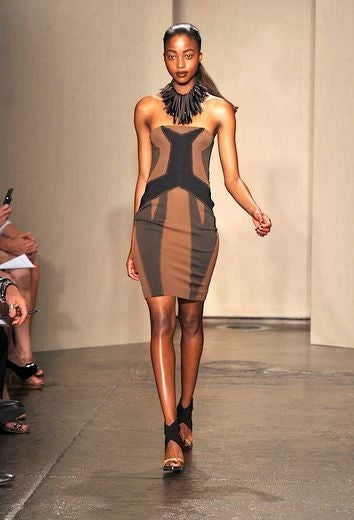
La Ferla wrote, “It’s tempting all the same to speculate that more than a few [designers] employed a larger-than-usual contingent of Black women simply because their darker skin made a pleasing canvas for the raucously colorful designs [that are in this season] — in short, because they sell the clothes.”
She added, “Such moves, if they were deliberate, make sound commercial sense. Do they speak to real inclusion?”
At least one industry insider said no. “An increase is good if it’s proportionate to the population and represents the people that are buying,” said Travis Given, a manager with Major Model agency in New York. “But that doesn’t seem to be happening yet.”
La Ferla noted that Black women spend close to $23 billion a year on clothes, according to TargetMarkets.com.
As a self-proclaimed fashionista with a crammed, color-coordinated closet, it has never sat well with me that so many of the models that introduce me to the clothes I fawn over — and buy – are not Black. I wonder, is it because there’s a widespread belief that as minorities Black women can’t sell clothes to the non-Black masses? Is the exclusion — it’s not a coincidence, as hard as people may try to downplay it – about mainstream belief that Black just isn’t as beautiful and the designers don’t want the association (even if they think otherwise)?
Are these clothes that are bought by me but not marketed to me, made for me? Am I supporting this thinking by buying this skirt? Hold up, am I thinking way too much about this skirt?
The lack of Black models is so commonplace, it’s cliché. And perhaps that’s why seeing an abundance of them on the runway at this year’s annual Arise Fashion Show gave me life. The ‘Made in Africa’ celebration showcased the spring/summer 2012 collections of seven of the continent’s leading fashion designers. The clothes were featured on the backs of a bevy of elegant Black models, including Sessilee Lopez, Anais Mali, Georgie Badiel, Aminat Ayinde, and Nana Keita, and it all struck me so hard because all those beautiful Black models in one place are so rarely seen… at least now.
In her Times piece, La Ferla noted that in the 1970s, couture stars like Yves Saint Laurent and Hubert de Givenchy prominently featured Black women.
“Years ago the runways were almost dominated by Black girls,” J. Alexander, a runway coach on “America’s Next Top Model,” told Guy Trebay in The New York Times in 2007.
What can we do to get back to those days?
Demetria L. Lucas is the Relationships Editor at ESSENCE and the author of “A Belle in Brooklyn: Your Go-to Girl for Advice on Living Your Best Single Life” (Atria) in stores now. Ask her your dating and relationship questions on Formspring.me/abelleinbk